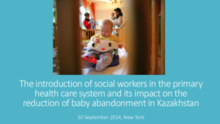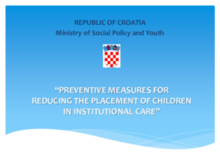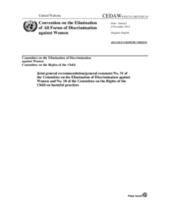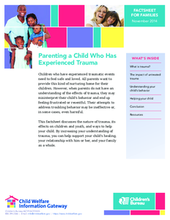Displaying 11941 - 11950 of 14429
On 10 September 2014, UNICEF and the Permanent Mission of Bulgaria co-hosted a high level Lunchtime Discussion on The right of children below three years to live in a caring and supportive family environment: examples from Central and Eastern Europe and Central Asia. The discussion took place on the margins of the September meeting of the UNICEF Executive Board and brought together over 80 participants, including members of the UNICEF Executive Board, representatives of the Permanent Missions to the UN from the CEE/CIS region, international organizations, NGOs, high level UNICEF and National Committee staff.
On 10 September 2014, UNICEF and the Permanent Mission of Bulgaria co-hosted a high level Lunchtime Discussion on The right of children below three years to live in a caring and supportive family environment: examples from Central and Eastern Europe and Central Asia. The discussion took place on the margins of the September meeting of the UNICEF Executive Board and brought together over 80 participants, including members of the UNICEF Executive Board, representatives of the Permanent Missions to the UN from the CEE/CIS region, international organizations, NGOs, high level UNICEF and National Committee staff.
On 10 September 2014, UNICEF and the Permanent Mission of Bulgaria co-hosted a high level Lunchtime Discussion on The right of children below three years to live in a caring and supportive family environment: examples from Central and Eastern Europe and Central Asia. In its presentation at the discussion, Kazakhstan demonstrated how the integration of social workers and outreach services in the health sector is reducing baby abandonment in pilot areas of the country.
On 10 September 2014, UNICEF and the Permanent Mission of Bulgaria co-hosted a high level Lunchtime Discussion on The right of children below three years to live in a caring and supportive family environment: examples from Central and Eastern Europe and Central Asia.The discussion took place on the margins of the September meeting of the UNICEF Executive Board and brought together over 80 participants, including members of the UNICEF Executive Board, representatives of the Permanent Missions to the UN from the CEE/CIS region, international organizations, NGOs, high level UNICEF and National Committee staff. Representatives from Croatia presented on preventing institutionalization of children.
Globalsl.org shares two hour-long presentations by an individual who works directly with the issue of orphanage tourism in Nepal, and another individual who has coordinated a global, child-protection-focused, inter-agency initiative directly tied to orphanage tourism.
This podcast is a presentation given by Kate Van Doore at the Interdisciplinary Conference on Human Trafficking held on October 9-11 2014 at the University of Nebraska.
This article highlights the reality that Philippines’ typhoon orphans face. aiyan, the strongest storm on record to ever hit land, struck Villanueva's coastal community with such ferocity on Nov. 8 last year
This Joint General Recommendation from the Committee on the Elimination of Discrimination against Women (CEDAW) and the Committee on the Rights of the Child (CRC) is aimed at clarifying the obligations of States to these Conventions regarding “harmful practices.”
This article highlights the situation that The National Commission for Children (NCC), in Rwanda, is facing as it looks for new ways to address the challenge of integrating orphans who have reached adulthood into foster families. The law does not allow orphans aged 18 and above to stay in orphanages, which government has been phasing out in the last two years.
This factsheet discusses the nature of trauma, its effects on children and youth, and ways to help your child.






